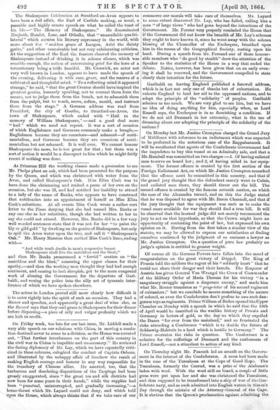On Friday week, too late for our last issue, Mr.
Liddell made a very able speech on our relations with China, in moving a resolu- tion destined never to come to a division, as the House was counted out, "That further interference on the part of this country in the civil war in China is impolitic and unnecessary." lie reviewed the daring diplomacy of Mr. Lay, which we have repeatedly criti- cized in these columns, eulogized the conduct of Captain Osborn, and illustrated by the unhappy affair of Soochow the result of making English courage and honour in any way responsible for the treachery of Chinese allies. He asserted, too, that the barbarous and desolating dispositions of the Taepings had been grossly exaggerated, since "the great tea and silk districts had now been for some years in their hands," while the supplies had been "punctual, uninterrupted, and gradually increasing,"—.a home-thrust which Mr. Layard could not deny, and which told n,ru the House, which always thinks that if we take care of our commerce our morals will take care of themselves. Mr. Layard to some extent disavowed Mr. Lay, who has failed, calling him a man "of large views "who had gone beyond the intentions of the Government. Mr. Forster very properly reminded the House that if the Government did not know the breadth of Mr. Lay's schemes they ought to have known it, since he lvent away with the solemn blessing of the Chancellor of the Exchequer, breathed upon him in the rooms of the Geographical Society, resting upon his head. During a speech from Mr. Ferrand one of those honour- able members who "do good by stealth" drew the attention of the Speaker to the statistics of the House in a way that ended the debate. Notice, however, has been given that on an early even- ing it shall be renewed, and the Government compelled to state clearly their intention for the future.


































 Previous page
Previous page